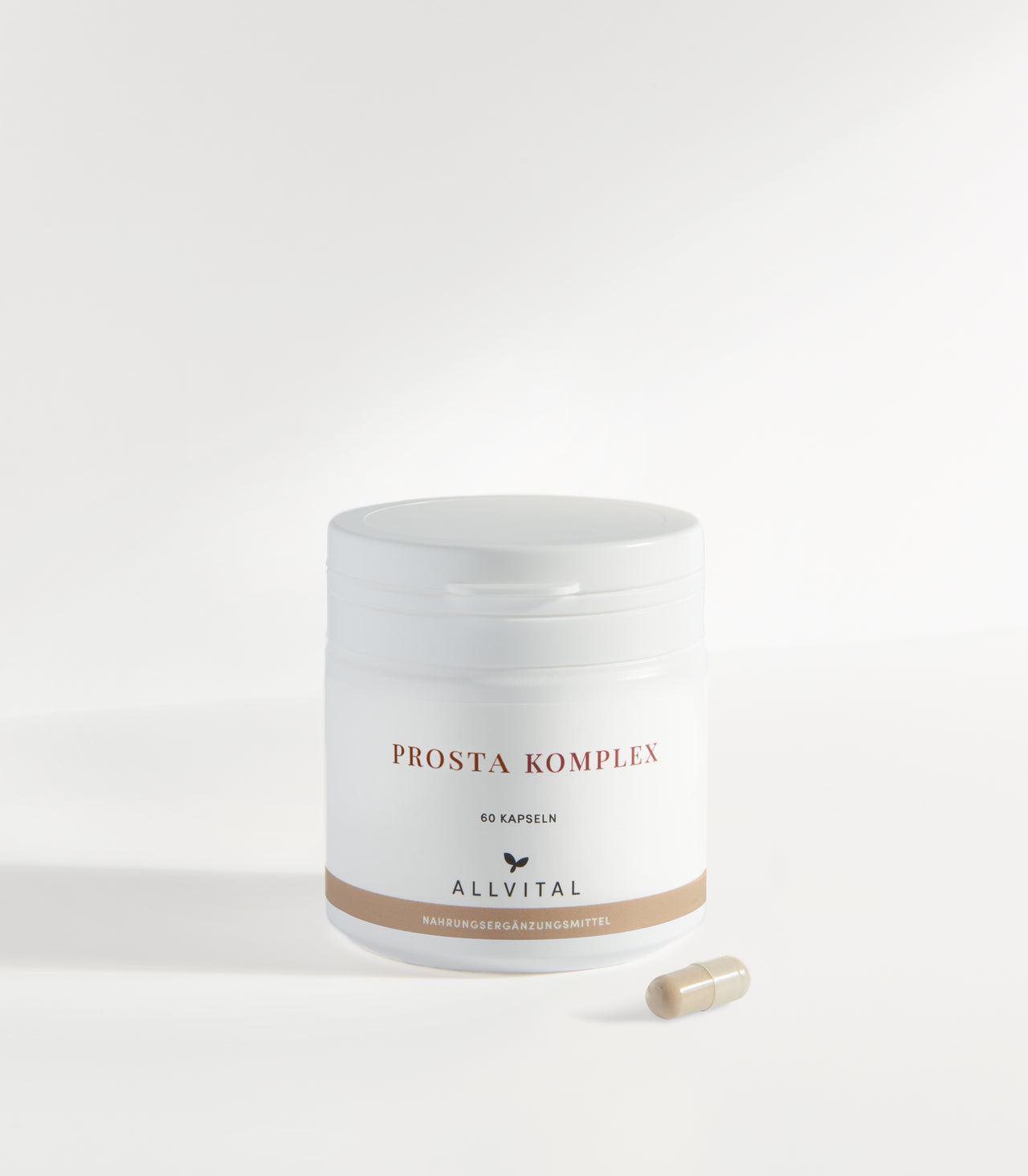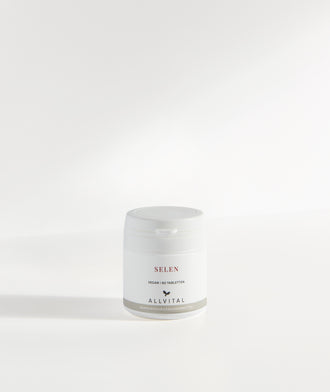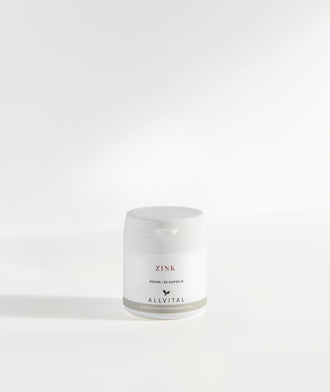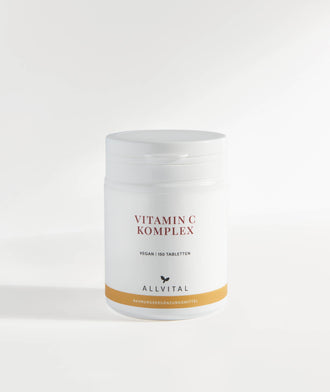
Strengthening the prostate naturally
The prostate plays a central role in men's health. Here’s how you can naturally support this essential organ with vital nutrients and a healthy lifestyle.
What is the prostate and why is it important?
The prostate, also known as the prostate gland, is a small, walnut-sized organ located just below the bladder and above the pelvic floor muscles. It is part of the male reproductive system, meaning women do not have a prostate.
The primary function of the prostate is to produce seminal fluid, which is essential for transporting, protecting, and maintaining the mobility and fertilization ability of sperm. During ejaculation, the prostate releases its secretion into the urethra, where it mixes with sperm from the testes and secretions from other glands.
Another key function of the prostate is to convert the male sex hormone testosterone into its biologically active form, DHT (dihydrotestosterone). This gland is, therefore, crucial to maintaining a healthy hormonal balance in men.
In the following sections, we provide an overview of various prostate diseases and explain how a healthy diet and lifestyle, along with certain micronutrients, can strengthen the prostate. We will also introduce our new product, Prosta Complex, developed specifically for this purpose.
What prostate diseases exist?
The most common prostate conditions include benign prostatic hyperplasia (BPH), prostatitis, and prostate cancer. These conditions manifest through different symptoms.
Benign prostatic hyperplasia (BPH)
BPH is the benign enlargement of the prostate. It often begins after age 40 due to changes in hormonal levels. Initially, this growth is usually asymptomatic, but as the gland enlarges, it can constrict the urethra, leading to urinary problems. Nearly one in two men over 50 is affected (1).
Typical symptoms include frequent or delayed urination, nighttime urination, a weak urine stream, and a sensation of incomplete bladder emptying, which can significantly impair quality of life (1). If untreated, BPH can damage the kidneys and bladder over time, increasing the risk of urinary tract infections and prostate inflammation (1).
Although the exact cause of BPH is not fully understood, several risk factors are known and will be discussed in the following sections.
Prostatitis
Prostatitis is inflammation of the prostate, which can be caused by infections such as chlamydia or mycoplasma. In many cases, however, the exact cause remains unknown. About half of all men experience prostatitis at some point in their lives. Symptoms include pressure in the rectal area, lower abdominal and back pain, or difficulty urinating (1).
Prostate cancer
Prostate cancer is the most common type of cancer among men in Germany. Early symptoms are usually absent or nonspecific, but later, symptoms like pain, blood in urine or semen, and problems with urination or bowel movements may appear. Early detection improves the chances of recovery, which is why regular screenings are vital (1).
Nutrition for a healthy prostate
A healthy, anti-inflammatory diet plays a crucial role in preventing chronic diseases and supporting recovery.
Here are some dietary tips for promoting prostate health (2) (3) (4):
- Avoid alcohol, processed foods, excessive sugar, easily digestible carbohydrates, unhealthy fats (such as seed oils and heated vegetable fats), and gluten-containing grains.
- Include organically grown vegetables, herbs, and fruits in your diet. Tomatoes, in particular, are recommended for prostate health due to their high content of the carotenoid lycopene and other phytochemicals (5). Cooking tomatoes and adding a bit of oil enhances nutrient absorption.
- Incorporate legumes, nuts, anti-inflammatory spices such as turmeric and ginger, moderate amounts of gluten-free grains, and high-quality animal products.
By following these tips, you can significantly reduce the intake of harmful and pro-inflammatory substances while supplying your body with a variety of essential nutrients and fiber. However, for optimal nourishment, targeted supplementation with micronutrients is also recommended.
Key nutrients for prostate health
Our Prosta Complex supplement is designed to support prostate health and is formulated based on the latest scientific research. Each ingredient has specific functions that complement one another.
The following plant extracts and phytonutrients are included in Prosta Complex:
- Saw palmetto extract
- Nettle root extract
- Lycopene
- Pumpkin seed extract
- Beta-sitosterol
- Pygeum africanum extract
Research shows promising results for these substances in the treatment of prostate conditions, and they are already being used in medical practice. For example, a licensed herbal remedy for BPH with saw palmetto extract (Permixon) as its active ingredient is available.
Since the European authorization process for health claims related to these ingredients is still pending (as of 09/2024), we are unable to provide further details at this time.
Additionally, Prosta Complex contains the trace elements zinc and selenium:
- Zinc contributes to maintaining normal testosterone levels in the blood and supports fertility and reproduction.
- Selenium has antioxidant properties, protecting prostate cells from oxidative stress, and it also plays a role in sperm production.
How does Prosta Complex support the prostate?
Prosta Complex provides the prostate with essential micronutrients required for metabolic processes within the gland. Moreover, it delivers valuable antioxidants that protect the prostate from oxidative stress and environmental toxins.
The core ingredients of Prosta Complex are the plant extracts mentioned above, which we have dosed according to current research. You can find more detailed information on these studies on platforms like PubMed.
Why are supplements beneficial?
You might wonder if it’s sufficient to simply eat more foods like pumpkin seeds or tomatoes. Unfortunately, it’s nearly impossible to achieve an effective dosage of key ingredients solely through diet. You would need to consume large quantities of specific foods daily, without the guarantee that the desired nutrients are present in sufficient amounts. Furthermore, some of the ingredients in Prosta Complex are not found in common foods.
To fully benefit from the ideal combination and dosage of these powerful compounds, supplements are the best option.
Who should take Prostate Complex?
Prosta Complex is particularly suitable for adult men who want to take preventative measures for prostate health. It’s also helpful for men already experiencing symptoms. If you are under medical care, you should consult with your doctor or therapist before taking the supplement.
How should you take Prostate Complex?
We recommend taking two capsules per day with a meal. This dosage ensures optimal nutrient absorption. The time of day for taking the supplement does not matter.
Additional tips for a healthy prostate
In addition to a healthy diet and supplements, here are some more ways to support prostate health:
- Exercise regularly: Physical activity improves circulation and strengthens the pelvic floor, contributing to better prostate health.
- Stay hydrated: Drinking plenty of water helps flush out toxins and pathogens from the urinary tract.
- Maintain a healthy weight: Obesity is a known risk factor for prostate diseases.
- Manage stress and get enough sleep: Chronic stress and lack of sleep can negatively affect prostate health.
- Limit exposure to electromagnetic radiation (EMR): Avoid placing laptops and phones directly on your lap to minimize EMR exposure.
- Reduce toxins: Smoking, synthetic fabrics, plastic food containers, and other environmental factors can harm the body, including the reproductive organs and hormonal balance.
Prostate screenings and check-ups
Regular prostate screenings are crucial for early detection of prostate problems. In Germany, annual screenings are covered by statutory health insurance starting at age 45. This includes a digital rectal exam, in which the doctor feels the prostate through the rectum to check for abnormalities.
Additionally, the PSA (prostate-specific antigen) level in the blood can be measured upon request. PSA is a protein produced by prostate cells, and elevated levels may indicate prostate cancer. Other diagnostic methods, such as urine flow tests, ultrasound exams, or biopsies, are only performed if there is suspicion of a disease.
Is Prostate Complex suitable for women?
The product is specifically formulated and dosed for prostate health. We recommend different products for women. You can find a selection under the "Women's Health" section on our website.
How can women support their partners?
Women can encourage their partners to maintain regular medical check-ups and adopt a healthy lifestyle. A balanced diet, shared physical activities, and a conscious awareness of prostate health can make a big difference.
Conclusion: Vital nutrients and a healthy lifestyle strengthen the prostate
There are many ways to support prostate health. The key factors are a healthy diet, regular exercise, stress management, and targeted supplementation.
Sources
- Häufige Erkrankungen der Prostata. Urologische Stiftung Gesundheit [Internet]. [aufgerufen am: 15.09.2024].
- Tzonou A, Signorello LB, Lagiou P, et al. Diet and cancer of the prostate: a case-control study in Greece. Int J Cancer 1999;80:704-8.
- Giovannucci E, Ascherio A, Rimm EB, et al. Intake of carotenoids and retinol in relation to risk of prostate cancer. J Natl Cancer Inst 1995;87:1767-76.
- Giovannucci E. Tomatoes, tomato-based products, lycopene, and cancer: review of the epidemiologic literature. J Natl Cancer Inst 1999;91:317-31.
- Natali PG, Piantelli M, Minacori M, Eufemi M, Imberti L. Improving Whole Tomato Transformation for Prostate Health: Benign Prostate Hypertrophy as an Exploratory Model. Int J Mol Sci. 2023;24(6):5795. Published 2023 Mar 17.




